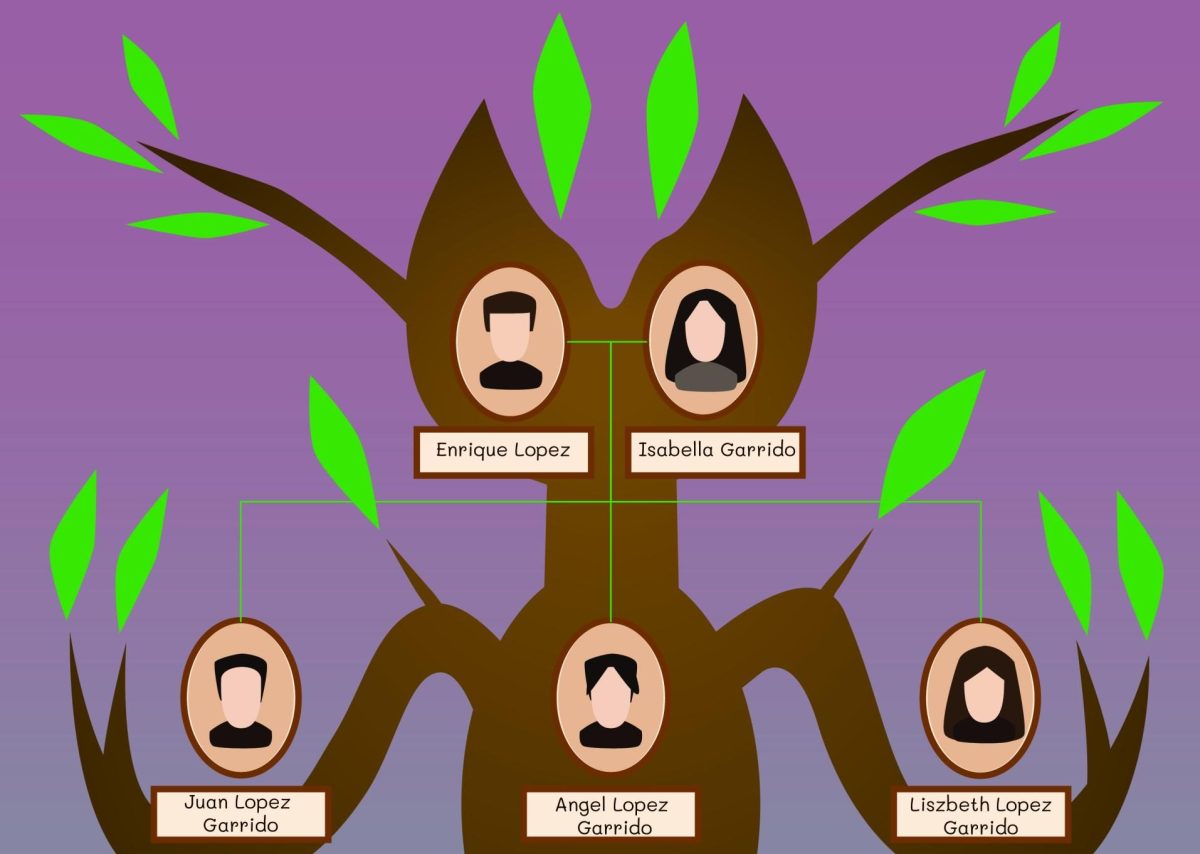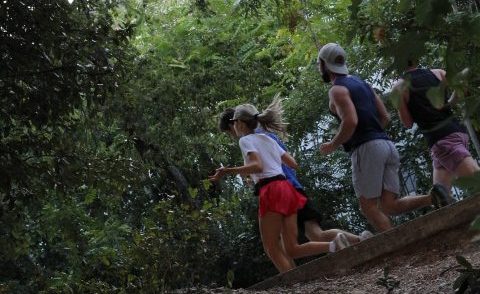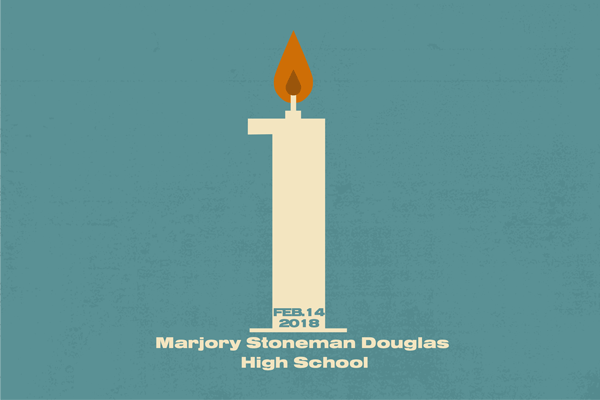
By ANDREW WALTER
@AndyWalterETC
One year ago today, 17-year-old David Hogg was sitting in his environmental science class in Parkland, Florida, shivering because his teacher left the door open on a chilly, 55-degree Valentine’s Day afternoon.
He was halfway listening to the lecture on municipal waste, which he’d later equate as his own understanding of how the U.S. government operates.
It was like any other day at Marjory Stoneman Douglas High School, which had always been a safe, ordinary school in a cozy, primarily white neighborhood. Hogg’s FBI agent father had moved his family away from Los Angeles when he was a freshman, so he was used to the Florida lifestyle by now.
He could hear his friend Emma Gonzalez outside the classroom handing out carnations and Valentine’s cards with the school’s Gay-Straight Alliance.
Then he heard a pop.
Hogg looked at the door and then at his seat partner.
“Hey, that sounded like a gunshot,” he said.
He didn’t know it yet, but that sound marked the beginning of the deadliest high school shooting in American history. The Marjory Stoneman Douglas High School shooting lasted less than an hour and left 17 students and staff dead and 17 more injured.
Then the fire alarm went off for the second time that day. Hogg and his classmates figured it was just the culinary arts program practicing their “pyrotechnics.”
As he and his classmates left their room for their designated fire evacuation zones, Hogg saw a sea of high school kids run in the opposite direction.
Then he heard another pop.
A janitor urged Hogg and his classmates to follow the crowd. He said the shooter was near the freshman building, which Hogg’s class was headed straight toward.
The culinary arts program teacher directed Hogg and about 80 other students into her classroom. Hogg would spend the next two hours in that cramped classroom.
His recordings from that lockdown propelled him into the national spotlight, for better or worse.
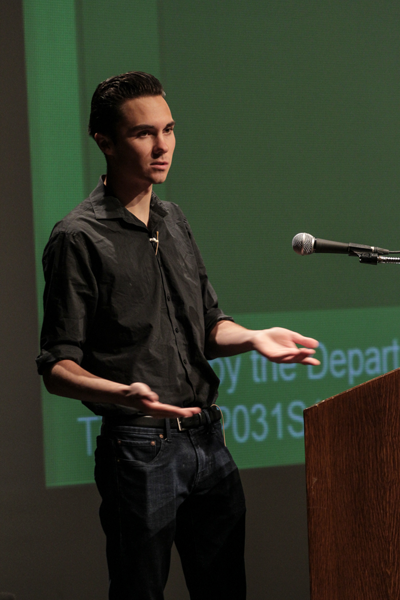
“As a student journalist, I felt the need to tell the story of what was happening,” he said. “In case we died in our classroom, and our bodies were left behind on that floor, hopefully our voices would carry on and create some kind of change so that nobody else would have to live though this.”
Little did Hogg know that a year after the shooting, he would travel across America, rally voters and activists and become one of the most controversial, and one of the youngest, American political figures.
One of those stops was at Brookhaven College Jan. 29, speaking to a crowd of mostly early college high school and college students. He told them all about what he’s been through, what he’s accomplished because of it and how they can make a difference in their communities and country too.
“Active shooter drills have become a part of our lives and a part of our generation and that we have to live through,” he said. He then compared fire drills to active shooter drills. “The difference is gun violence is not an act of God. Gun violence is something that we can stop. Gun violence is the act of man that shouldn’t have a gun in the first place.”
Through his advocacy and the work of anti-gun violence movements such as March for Our Lives, Hogg has inspired countless mass demonstrations and helped impose gun laws across the U.S., such as the bump stock ban, and strengthen the effectiveness background checks by supporting the Fix NICS Act of 2017.
He’s also helped bring about the implementation of “red flag” legislation that allows law enforcement or family in several states to petition for the temporary confiscation of a person’s firearms and has convinced many corporations to cut ties with the National Rifle Association.
[READ MORE: DCCCD seeks more funding, no tax cap from 86th Legislature]
This has made him a hero to some, especially many American youth. It’s also made him a villain to Americans who adamantly uphold the Second Amendment.
“It’s kind of hard to start something by yourself, so it’s crazy that you’ve come this far,” said mortuary science major Mickey McMillan during the audience Q&A. “I guess I could speak for everyone else, or just me, but we’re really proud of you. It’s really amazing that you’re standing up and you’re saying, ‘This is not OK.’ ”
McMillan said she felt a connection to Hogg because her younger sister had a friend die in a school shooting. Hogg nodded in agreement.
He spoke about his younger sister Lauren, who’d been there to comfort him following the shooting. She even followed him on his most recent bus tour in support of his activism.
Hogg has faced both praise and scorn from the media. Even with the spotlight on him, he believes in the importance of dialogue with his critics and naysayers.
Former Dallas Morning News photojournalist Nate Hunsinger said Hogg was remarkable when he visited Paul Quinn College in July 2018 during the March for Our Lives Road to Change tour.
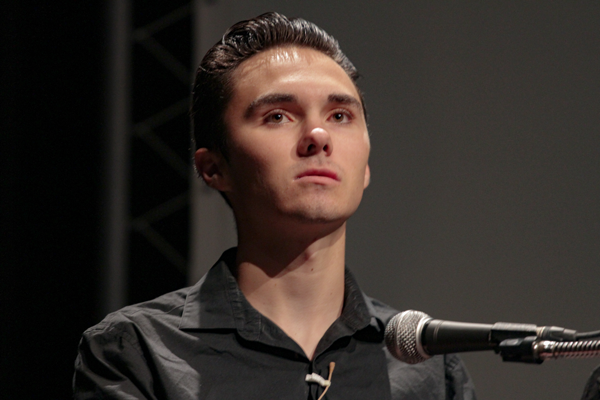
Even after being confronted by a gun-rights protestor wearing a red “STRAIGHT OUTTA MERICA” T-shirt and surrounded by other protestors carrying pistols and rifles, Hunsinger said Hogg behaved in a professional manner and spoke eloquently.
“He turned a mob of screaming people into a rational body,” Hunsinger said. “It was amazing for someone of his age.”
Hogg and another volunteer, Matthew Deitsch, had left the March for Our Lives panel and walked across the street to meet the group of protestors they’d heard were outside the college.
Hogg and Deitsch jumped over a wall to speak with the demonstrators. Hogg assured the man in the red T-shirt and the other protestors that he was only advocating for “common-sense gun reform.”
Hogg recalled the interaction during his visit to Brookhaven.
“Why are you trying to take my guns away?” Hogg said the man in the red “STRAIGHT OUTTA MERICA” T-shirt asked.
“Are you trying to kill yourself?” Hogg asks the man.
The man said no.
“Are you a domestic abuser?”
The man said no.
“Are you a terrorist?”
The man said no once again.
“Then I’m not trying to take your guns away,” Hogg said.
He then told the protestors that Nikolas Cruz, the Stoneman Douglas shooter, shouldn’t have been able to get a gun when there were multiple FBI warnings against him.
Hunsinger thought at the time that there was no way that 18-year-old kid wasn’t trembling with fear around the protestors he described as threatening.
By the end, he and the man in the red T-shirt were shaking hands.
“It wasn’t a scary situation at all,” Hunsinger said. “It was more of a debate.”
David Hogg, the kid who went from having a less than 3.0 GPA before transferring to Stoneman Douglas became the face of youth activism and was accepted to Harvard University, all because of what he chose to do following one of the most horrific tragedies in American history.
“It’s not me that’s standing up, it’s us that’s standing up,” Hogg said. “Because this movement isn’t about any individual. Because movements don’t attach themselves to sole individuals, they attach themselves to the source of evil.”
https://eastfieldnews.com/2019/02/05/hogg-visits-brookhaven-encourages-activism/


